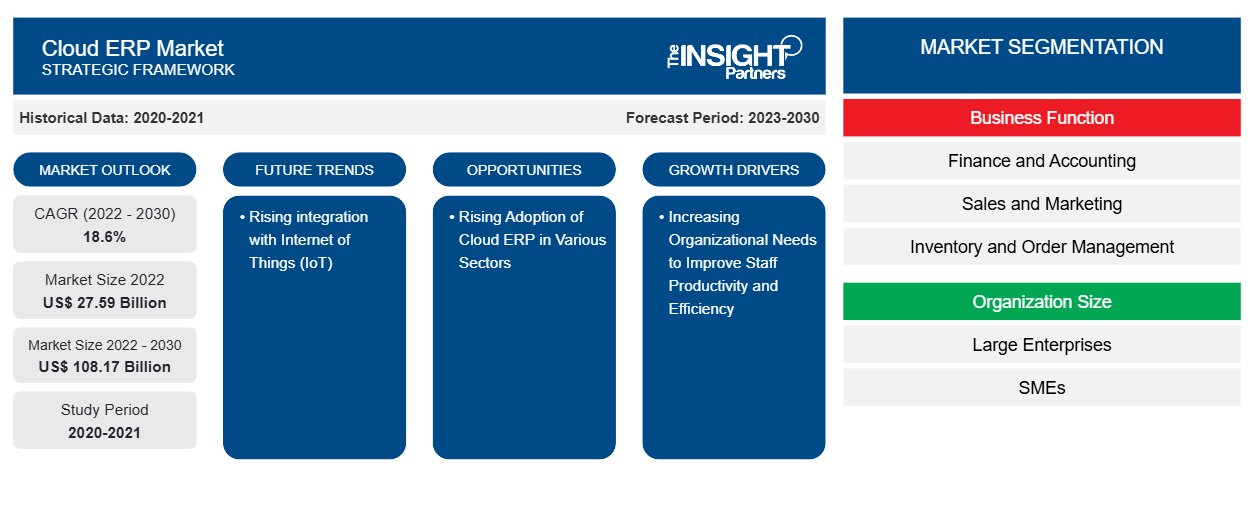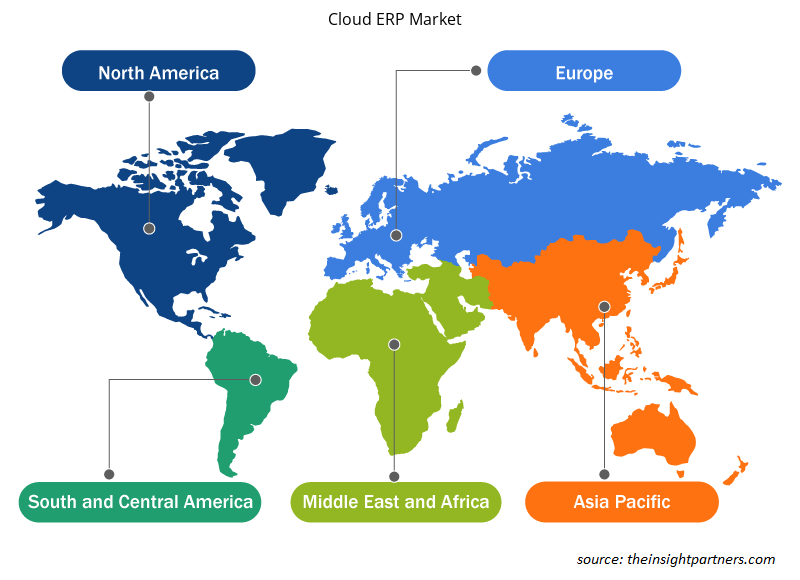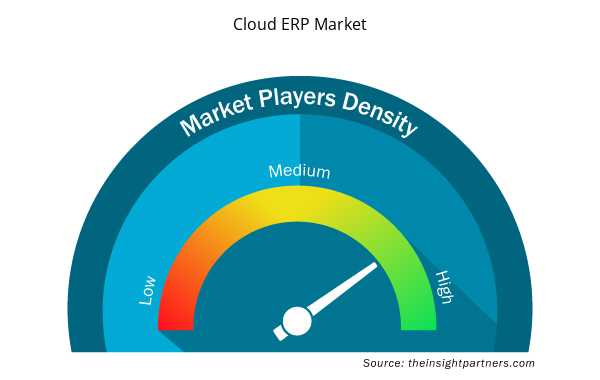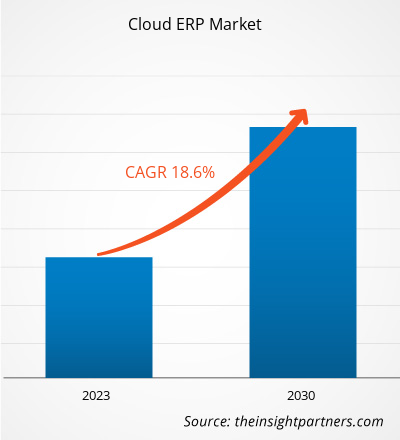The cloud ERP market is expected to grow from US$ 27.59 billion in 2022 and is expected to reach US$ 108.17 billion by 2030; it is estimated to record a CAGR of 18.6% from 2022 to 2030. The rising integration with the Internet of Things (IoT) is likely to remain a key trend in the market.
Cloud ERP Market Analysis
Various companies are launching new cloud-based ERP software. For instance, in June 2023, 10X ERP announced the launch of its cloud-based ERP software, which is specifically designed to cater to the needs of small to medium-sized industrial distribution businesses. The solution offers an intuitive, user-friendly, and fast experience. Its core capabilities encompass a wide range of features, including sales and purchase order entry, inventory management, customer and vendor relationship management, real-time dashboards, a custom shipping integrator, QC management tools, and a robust, fully integrated accounting system that provides real-time data. Such initiatives by the market players are fueling the growth of cloud ERP in the market. In addition, the growing adoption of cloud ERP software in various industry verticals, including manufacturing, IT and telecom, BFSI, healthcare, retail, and others, is fueling the growth of the market. Furthermore, the growing technological advancement in the software is further expected to fuel the growth of the cloud ERP market
Cloud ERP Market Overview
Cloud ERP is known as an enterprise resource planning software that can be accessed over the Internet. Hosted on a provider’s cloud computing platform, cloud ERP is typically delivered as a service (software-as-a-service or SaaS ERP). Cloud ERP software provides various advantages; one of the largest advantages of cloud ERP software is its almost limitless customizability. Add-on solutions, open APIs, industry-specific functions, and role-based dashboards allow companies to implement powerful decision-making tools, unparalleled data visibility, and a future-proof platform for success. Enterprises can implement chosen editions that have been designed to the needs of their specific industries—distribution, manufacturing, retail, and construction, among others. The field and office teams work in tandem to complete multiple projects under budget and on time, but challenges arise when they do not have efficient information. Construction-specific ERP software integrates applications and systems—including financials, job cost accounting, inventory, CRM, payroll, and project management, among others—for a complete, real-time view of the business that instantly connects all workers in the team.
Customize This Report To Suit Your Requirement
You will get customization on any report - free of charge - including parts of this report, or country-level analysis, Excel Data pack, as well as avail great offers and discounts for start-ups & universities
Cloud ERP Market: Strategic Insights

- Get Top Key Market Trends of this report.This FREE sample will include data analysis, ranging from market trends to estimates and forecasts.
Customize This Report To Suit Your Requirement
You will get customization on any report - free of charge - including parts of this report, or country-level analysis, Excel Data pack, as well as avail great offers and discounts for start-ups & universities
Cloud ERP Market: Strategic Insights

- Get Top Key Market Trends of this report.This FREE sample will include data analysis, ranging from market trends to estimates and forecasts.
Cloud ERP Market Drivers and Opportunities
Increasing Organizational Needs to Improve Staff Productivity and Efficiency to Favor Market
Businesses are continuously seeking ways to boost their output and effectiveness in the current fast-paced, intensely competitive commercial landscape. Cloud-based enterprise resource planning (ERP) systems have garnered significant attention as they assist in business growth, collaborations, and effective operations. Cloud ERP offers a variety of benefits over traditional on-premise systems. Cloud-based systems are accessible from anywhere with an Internet connection. This means that employees can retrieve critical business collaboration data and perform tasks remotely. For example, sales representatives can access real-time inventory data while on the go, which allows them to execute timely customer interactions. Cloud ERP provides real-time data updates and analytics, which can be utilized to make informed decisions. For example, using data obtained from cloud ERP systems, managers can monitor inventory levels and demand in real-time, allowing for proactive restocking and optimized production schedules. Cloud ERP includes collaboration tools, which improve teamwork and coordination. For example, a cloud ERP system facilitates project management and collaboration among remote teams, streamlining project workflows and reducing errors. Further, cloud ERP can reduce operational costs by automating processes and reducing the need for on-premise infrastructure.
Rising Adoption of Cloud ERP in Various Sectors
The Cloud ERP market has grown strongly in the past few years, and one major driving factor for this has to be digitalization in Cloud ERP systems. Owing to advanced technologies and increasing demand from businesses for streamlined and effective tax processes, the demand for digital solutions has been spiraling upward to make all activities related to taxes easier. Digitization of any Cloud ERP system has a lot of benefits associated with it for businesses of all scales and any person. One of the major advantages is the automation of all tasks related to taxation. This reduces manual effort and hence reduces the possibility of errors to a minimum. Through Cloud ERP, data entry, tax calculations, and reporting can be automated, ensuring accuracy and compliance with tax laws.
Cloud ERP Market Report Segmentation Analysis
Key segments that contributed to the derivation of the Cloud ERP market analysis are business function, organization size, and vertical.
- Based on business function, the market is segmented into finance and accounting, sales and marketing, inventory and order management, human capital management, others. The inventory and order management segment dominated the market in 2022.
- Based on organization size, the market is bifurcated into large enterprises, SMEs. The large enterprises segment dominated the market in 2022.
- Based on vertical, the commercial enterprises market is bifurcated into manufacturing, IT and telecom, BFSI, healthcare, retail, government, aerospace and defense, and others. The manufacturing segment dominated the market in 2022.
Cloud ERP Market Share Analysis by Geography
The geographic scope of the Cloud ERP market report is mainly divided into five regions: North America, Asia Pacific, Europe, Middle East & Africa, and South & Central America.
North America dominated the market in 2022. Technological changes have a substantial impact on the North American economy. All developed countries in North America have a significant focus on creating technological innovations. The US economy depends on technology substantially. As a result, many states have started major initiatives to ignite innovation and empower entrepreneurs. The most frequently mentioned technologies are the Internet of things (IoT), big data analytics, mobility, artificial intelligence (AI), digital media, biotechnology, telemedicine, and cloud computing. Various companies in North America are deploying new cloud-based software. For instance, in April 2023, SAP SE announced that the Greater Austin Merchants Cooperative Association (GAMA) selected SAP S/4HANA Cloud, which is a public edition to help future-proof the organization and support its business transformation. With SAP S/4HANA Cloud, public edition, the company is helping midsize businesses harness the proven benefits of cloud ERP with built-in industry best practices.
Cloud ERP Cloud ERP Market Regional Insights
The regional trends and factors influencing the Cloud ERP Market throughout the forecast period have been thoroughly explained by the analysts at Insight Partners. This section also discusses Cloud ERP Market segments and geography across North America, Europe, Asia Pacific, Middle East and Africa, and South and Central America.

- Get the Regional Specific Data for Cloud ERP Market
Cloud ERP Market Report Scope
| Report Attribute | Details |
|---|---|
| Market size in 2022 | US$ 27.59 Billion |
| Market Size by 2030 | US$ 108.17 Billion |
| Global CAGR (2022 - 2030) | 18.6% |
| Historical Data | 2020-2021 |
| Forecast period | 2023-2030 |
| Segments Covered |
By Business Function
|
| Regions and Countries Covered | North America
|
| Market leaders and key company profiles |
Cloud ERP Market Players Density: Understanding Its Impact on Business Dynamics
The Cloud ERP Market market is growing rapidly, driven by increasing end-user demand due to factors such as evolving consumer preferences, technological advancements, and greater awareness of the product's benefits. As demand rises, businesses are expanding their offerings, innovating to meet consumer needs, and capitalizing on emerging trends, which further fuels market growth.
Market players density refers to the distribution of firms or companies operating within a particular market or industry. It indicates how many competitors (market players) are present in a given market space relative to its size or total market value.
Major Companies operating in the Cloud ERP Market are:
- Acumatica Inc
- Infor Inc
- Microsoft Corp
- Oracle Corp
- Sage Group Plc
- SAP SE
Disclaimer: The companies listed above are not ranked in any particular order.

- Get the Cloud ERP Market top key players overview
Cloud ERP Market News and Recent Developments
The Cloud ERP market is evaluated by gathering qualitative and quantitative data post primary and secondary research, which includes important corporate publications, association data, and databases. A few of the developments in the Cloud ERP market are listed below:
- SAP and its partner SGN Software Pvt Ltd launched a flagship Cloud ERP offering designed for small and mid-sized organisations. (Source: SAP, Press Release, July 2024)
- Forterro, the European provider of ERP software solutions to the industrial mid-market, announced the UK launch of Fortee, its entry-level cloud-based ERP solution. Fortee has been designed specifically for the needs of SME discrete manufacturers and industrial startups and is based on 15 years of cloud-ERP learning. (Source: Forterro, Press Release, May 2024)
Cloud ERP Market Report Coverage and Deliverables
The “Cloud ERP Market Size and Forecast (2020–2030)” report provides a detailed analysis of the market covering below areas:
- Cloud ERP market size and forecast at global, regional, and country levels for all the key market segments covered under the scope
- Cloud ERP market trends as well as market dynamics such as drivers, restraints, and key opportunities
- Detailed PEST/Porter’s Five Forces and SWOT analysis
- Cloud ERP market analysis covering key market trends, global and regional framework, major players, regulations, and recent market developments
- Industry landscape and competition analysis covering market concentration, heat map analysis, prominent players, and recent developments for the superconductor market
- Detailed company profiles
- Historical Analysis (2 Years), Base Year, Forecast (7 Years) with CAGR
- PEST and SWOT Analysis
- Market Size Value / Volume - Global, Regional, Country
- Industry and Competitive Landscape
- Excel Dataset



Report Coverage
Revenue forecast, Company Analysis, Industry landscape, Growth factors, and Trends

Segment Covered
Business Function, Organization Size, Vertical

Regional Scope
North America, Europe, Asia Pacific, Middle East & Africa, South & Central America

Country Scope
This text is related
to country scope.
Frequently Asked Questions
The estimated value of the Cloud ERP market is expected to reach US$ 108.17 billion by 2030.
The market is expected to grow at a CAGR of 18.6% over the forecast period.
The rising integration with the Internet of Things (IoT) is likely to remain a key trend in the market.
Acumatica Inc, Infor Inc, Microsoft Corp, Oracle Corp, and Sage Group Plc are among the leading players in the Cloud ERP market.
North America dominated the Cloud ERP market in 2022.
The Cloud ERP market has grown strongly in the past few years, and one major driving factor for this is increasing organizational needs to improve staff productivity and efficiency.
Trends and growth analysis reports related to Technology, Media and Telecommunications : READ MORE..
The List of Compnies - Cloud ERP Market
- Acumatica Inc
- Infor Inc
- Microsoft Corp
- Oracle Corp
- Sage Group Plc
- SAP SE
- Workday Inc
- SYSPRO Proprietary Ltd
- Epicor Software Corp
- Unit4 Group Holding BV

 Get Free Sample For
Get Free Sample For